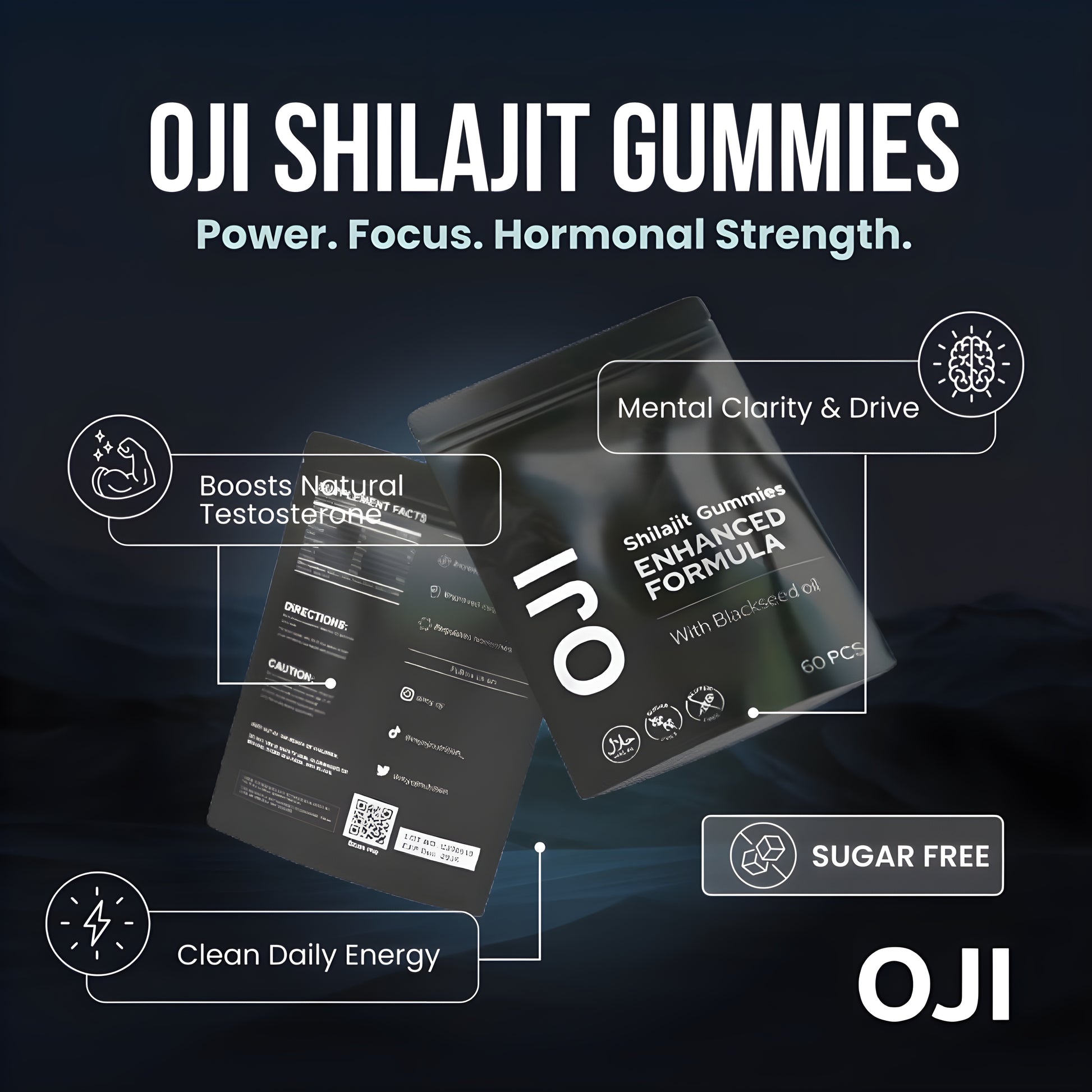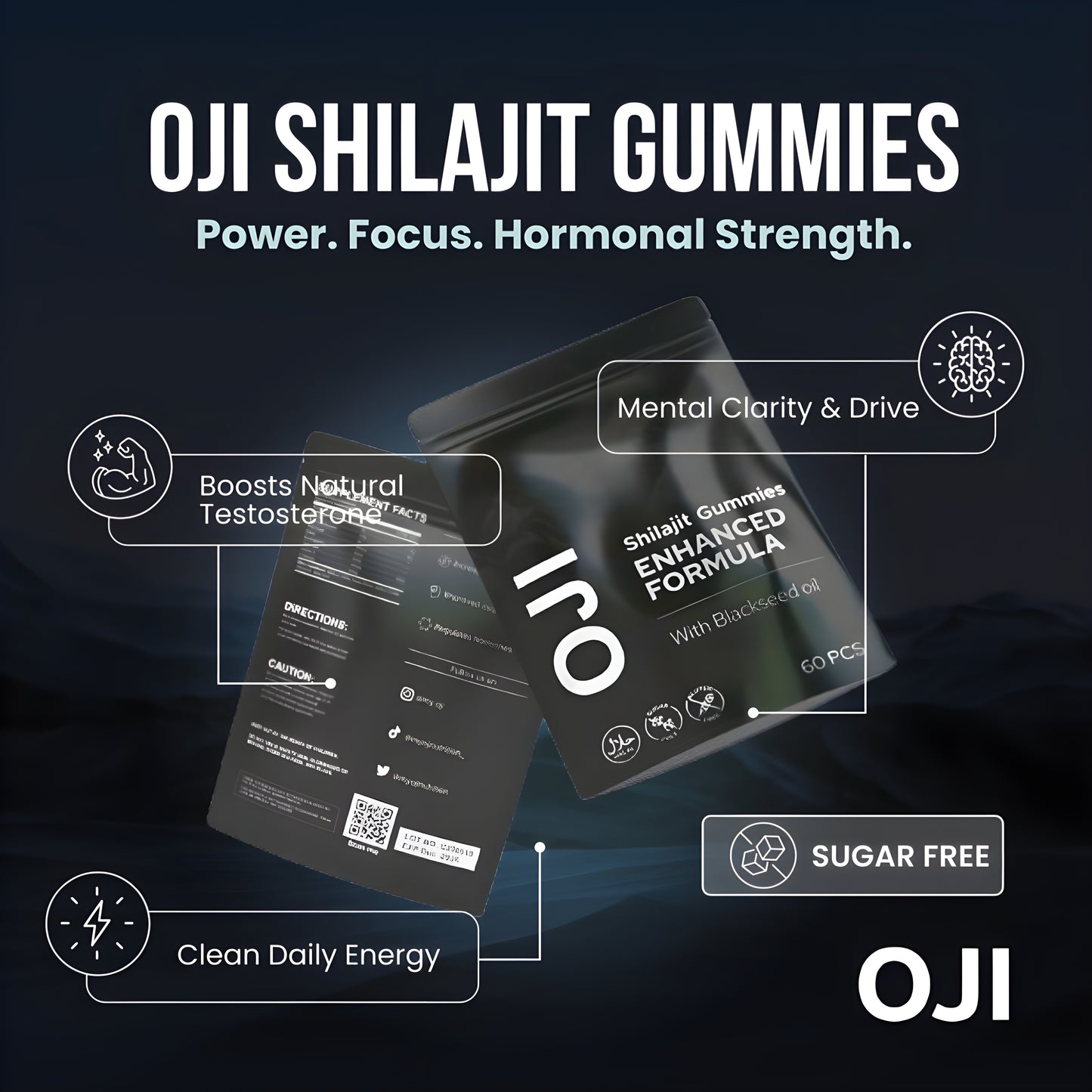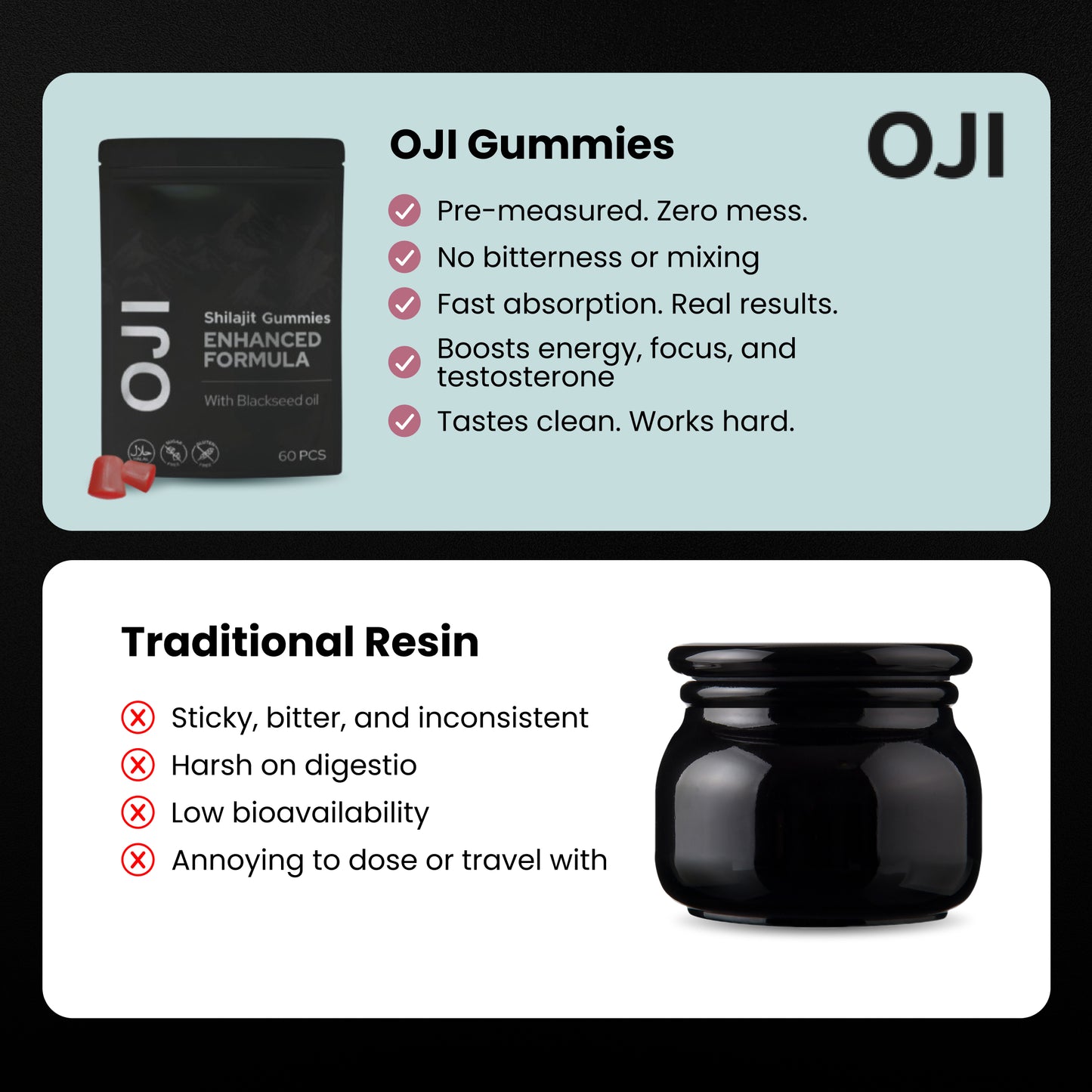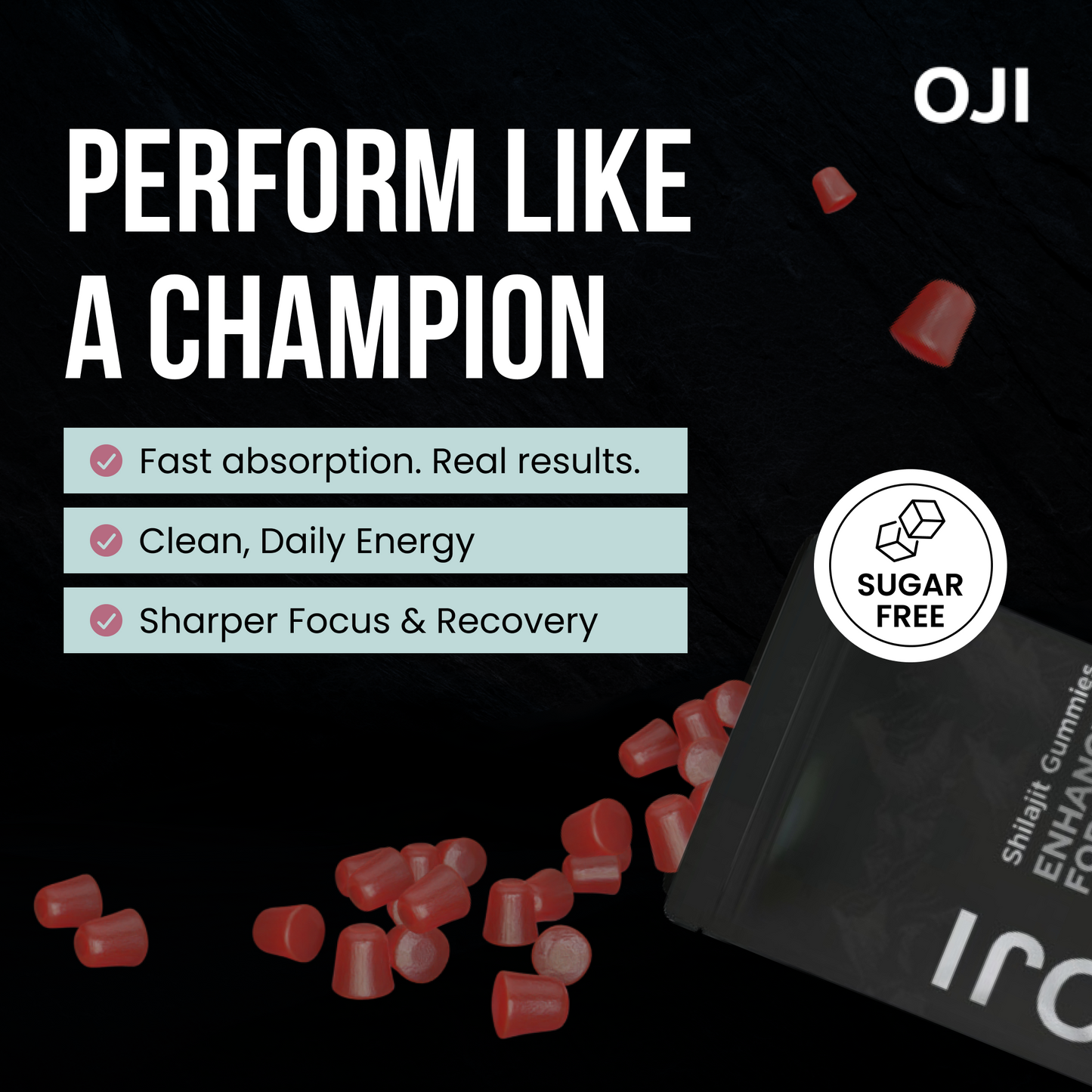The first step to feeling better isn't a supplement or a complicated diet—it's learning to listen to your body. Signs like constant fatigue or emotional instability are often the first signals that your hormones need support.
By recognising these signals, you can move from feeling confused and frustrated to taking clear, effective steps toward balance.
What Are Your Hormones Trying to Tell You?
Hormonal imbalances can be sneaky. They often show up as a collection of symptoms that are all too easy to brush off as just being "stressed" or "tired". But these persistent nudges from your body are valuable clues, pointing towards something deeper that needs your attention.
Think of it like learning your body's unique language. It might seem confusing at first, but once you start connecting the dots, you begin to understand what's really going on beneath the surface.
Beyond the Obvious Symptoms
When we think of hormonal issues, things like hot flashes often come to mind. But many other signs fly completely under the radar, disrupting your daily life long before you realise hormones are the culprit.
- Unexplained Fatigue: This isn't your typical end-of-day tiredness. It's a deep-seated exhaustion that a good night's sleep just can't seem to fix. This often points to issues with cortisol or thyroid function.
- Persistent Mood Swings: Feeling irritable, anxious, or emotionally fragile for no clear reason? Fluctuating levels of oestrogen and progesterone can have a huge impact on your brain's feel-good chemicals.
- Digestive Distress: Constant bloating, gas, or other tummy troubles can be directly linked to your hormones. The gut-hormone connection is incredibly strong; when one is off, the other often follows.
- Poor Sleep Quality: If you struggle to fall asleep or find yourself wide awake at 3 a.m., it's a classic sign of an imbalance. This could be due to cortisol spikes at night or low levels of progesterone, which helps calm the nervous system.
Decoding Your Symptoms: Potential Hormonal Links
To help you connect the dots, this table breaks down common symptoms and their potential hormonal drivers. It’s a quick-reference guide to help you understand what your body might be trying to tell you.
| Symptom You Feel | Potential Hormone Connection | What This Means for Your Body |
|---|---|---|
| Persistent Fatigue | Low Thyroid, High/Low Cortisol | Your body's energy regulation and stress response systems are out of sync. |
| Anxiety & Irritability | Low Progesterone, Oestrogen Fluctuations | Your calming hormones are low, or your stimulating hormones are unstable. |
| Weight Gain (especially around the middle) | High Cortisol, Insulin Resistance | Your body is in a state of chronic stress, leading it to store fat. |
| Brain Fog & Poor Memory | Low Oestrogen, Thyroid Imbalance | Hormones that support cognitive sharpness and clarity are not at optimal levels. |
| Low Libido | Low Testosterone, Low Oestrogen | The key hormones driving desire and sexual function are depleted. |
| Sleep Problems (Insomnia) | Low Progesterone, High Cortisol | Your 'sleepy' hormone is low, while your 'stress' hormone is too high at night. |
This isn't for diagnosis, of course, but it's a great starting point for becoming more aware of the patterns in your own body.
The Overlooked Role of Progesterone
So many hormonal issues, particularly for women, trace back to problems with ovulation and progesterone—something that often goes undiagnosed. Recent UK studies have really highlighted this. One analysis of over 211,000 menstrual cycles found that a massive 47% of women weren't showing clear signs of ovulation, and 22% had low progesterone levels.
This is a big deal. Progesterone isn't just for fertility; it's vital for mood stability, good sleep, and keeping oestrogen in check.
Hormonal imbalance isn't just about menopause or major life changes. More often, it’s a quiet disruption happening in the background, chipping away at your energy, mood, and overall sense of wellbeing every single day.
And it’s not just a female issue. Men are just as affected by hormonal shifts. For a closer look at this, our guide on the signs of low testosterone offers crucial insights. Recognising these signals is the first, most empowering step you can take towards getting back in balance, naturally.
Build Your Daily Hormone Support System
Achieving hormonal balance isn't about finding a magic pill. It's about the small, consistent choices you make every single day. By creating a supportive daily routine, you send a powerful signal to your body that it's safe and nourished, allowing it to shift out of a constant stress state.
Use this as your practical blueprint for building that foundation. We'll focus on three core pillars: nutrition, sleep, and stress management. Each one is something you can start incorporating into your life today to help your body rediscover its natural rhythm.
Action Step 1: Fuel Your Hormones with Smart Nutrition
What you eat is one of the most direct ways to influence your hormones. Food provides the literal building blocks for hormone production and helps regulate the signals they send throughout your body. Forget restrictive diets; the real goal is to add supportive, nutrient-dense foods.
Start by balancing your blood sugar. Every time your blood sugar spikes from sugary foods or refined carbs, your body pumps out insulin and cortisol to handle it. Over time, these constant hormonal surges can throw your entire endocrine system out of whack, especially your sex hormones.
To sidestep this, build each meal around the "hormone-friendly trio":
- Protein: Keeps you full and satisfied. Eat chicken, fish, eggs, lentils, or tofu.
- Healthy Fats: Your hormones are literally made from fats and cholesterol, so don't skip them! Get them from avocado, olive oil, nuts, and seeds.
- Fibre: This is vital for gut health and helps your body properly get rid of excess hormones like oestrogen. Load up on leafy greens, colourful veggies, and whole grains.
This infographic gives you a simple flow for checking in with your body to figure out what it needs.
The main takeaway here is that balancing your hormones naturally starts with a simple, three-part process: listen to your body's signals, connect them to what might be causing them, and then take small, supportive actions.
Action Step 2: Master Your Sleep for Cortisol Control
You can eat the perfect diet, but if your sleep is a mess, your hormones will struggle. Sleep is when your body does its most important repair work, resetting your nervous system and regulating key hormones like cortisol and melatonin.
A healthy cortisol rhythm means levels are high in the morning (to wake you up!) and then gradually taper off through the day, hitting their lowest point at night so you can sleep. Chronic stress and poor sleep habits can flip this rhythm on its head, leaving you exhausted in the morning and weirdly wired at night.
Your nightly sleep isn't just downtime; it's a critical hormonal reset button. Consistently getting 7-9 hours of quality sleep is one of the most powerful, non-negotiable things you can do for your hormonal health.
To get your sleep on track, create a relaxing wind-down routine that signals it's time to rest. Try these steps:
- Switch off screens at least an hour before bed. The blue light can interfere with melatonin production.
- Take a warm bath with Epsom salts, which are full of calming magnesium.
- Do some gentle stretching or read a physical book.
- Make your bedroom completely dark, quiet, and cool.
For more in-depth advice on making better sleep a part of your routine, it's worth reading up on enhancing sleep quality.
Action Step 3: Actively Manage Your Daily Stress
In our modern world, stress feels unavoidable. The thing is, your body doesn’t know the difference between being chased by a tiger and staring down a work deadline—it just pumps out cortisol. When that becomes your default state, cortisol stays high, which can suppress ovulation, mess with your thyroid, and disrupt your blood sugar.
Learning to manage your stress response is a game-changer for hormone balance. It's not about eliminating stress completely (that's impossible!), but about building resilience and having tools to bring your body back to a state of calm.
Effective stress management techniques don't have to take up your whole day. Even just a few minutes can make a world of difference.
| Technique | How It Helps Hormones | How to Start Now |
|---|---|---|
| Mindful Breathing | Directly lowers cortisol by switching on your "rest-and-digest" system. | Try the 4-7-8 breath: Inhale for 4 seconds, hold for 7, and exhale slowly for 8. Repeat 3-5 times. |
| Gentle Movement | Helps burn off excess stress hormones and releases feel-good endorphins. | Take a 10-minute walk outside on your lunch break. Just focus on your surroundings. |
| Journaling | Gets anxious thoughts out of your head so they stop driving up stress. | Before bed, spend 5 minutes writing down anything on your mind. No filter necessary. |
By consistently weaving these small, intentional habits into your day, you create a powerful support system that gives your hormones the best possible chance to thrive.
Using Movement and Detoxification for Better Balance
Once you have established the daily foundations of nutrition and sleep, you can bring in two more powerful tools: intelligent movement and effective detoxification. This isn't about pushing yourself to the limit or starting a harsh cleanse. Instead, the focus is on choosing the right kind of movement for your hormones and supporting the body’s incredible built-in systems for clearing out what it no longer needs.

When you get these two areas right, you create a clean, efficient internal environment. It allows your hormones to communicate clearly and do their jobs properly, bringing you that much closer to finding your natural equilibrium.
Action Step 4: Move Smarter, Not Harder
The "go hard or go home" approach to exercise can often backfire when you're trying to rebalance your hormones. Chronic high-intensity workouts, especially when you're already stressed, can keep your cortisol levels chronically elevated. This effectively locks your body in a state of high alert, which can throw everything from your menstrual cycle to your sleep patterns out of whack.
The real secret is to match your movement to what your body needs. For most of us on a journey to balance hormones naturally, that means shifting the focus from punishment to nourishment.
- Strength Training: Lifting weights or using your own body as resistance is phenomenal for hormonal health. It builds lean muscle, which in turn improves insulin sensitivity and helps you manage blood sugar. Aim for 2-3 sessions per week, prioritising big, compound movements like squats, deadlifts, and push-ups.
- Yoga and Pilates: These practices are brilliant for taming cortisol. They gently activate the parasympathetic nervous system (your "rest and digest" mode) while also building fantastic core strength and flexibility.
- Walking: Never underestimate the power of a simple walk, particularly if you can get outdoors. It’s a low-stress way to regulate cortisol, lift your mood, and support healthy digestion without adding more strain to your system.
The goal of exercise for hormonal health isn't to burn a maximum number of calories. It’s about sending a signal of strength and resilience to your body, not another signal of stress and emergency.
While relentless, intense cardio can sometimes be counterproductive, building a solid aerobic base is still vital for your overall health. If you need some pointers, our article on how to build cardiovascular endurance has some great, sustainable strategies that won't sabotage your hormonal goals.
Action Step 5: Support Your Body's Natural Detox Pathways
The word "detox" gets thrown around a lot, and it can be a bit misleading. You don’t need expensive juice cleanses or extreme fasts. Your body is already equipped with an incredibly sophisticated detoxification system, run primarily by your liver and your gut. Your job is simply to give these vital organs the support they need to work at their best.
This is absolutely crucial when it comes to hormones. Once a hormone like oestrogen has done its job, the liver has to process it, and the gut is responsible for showing it the door. If either of those systems is sluggish, used hormones can get reabsorbed back into your bloodstream, fuelling the very imbalances you’re trying to fix.
Nourish Your Liver for Efficient Processing
Think of your liver as your body’s master chemical processing plant. It has the immense job of metabolising everything you consume—food, medications, supplements—as well as your own hormones. You can support its vital work with a few simple nutritional tweaks.
- Eat Your Cruciferous Veggies: Broccoli, cauliflower, kale, and Brussels sprouts are packed with a compound called sulforaphane, which actively supports the liver's detox pathways.
- Include Sulphur-Rich Foods: Things like onions, garlic, and eggs provide sulphur, an essential ingredient for a key detox process called sulphation.
- Get Enough B Vitamins: Found in leafy greens, meat, and eggs, B vitamins are critical co-factors that help liver enzymes do their job.
Cultivate a Healthy Gut for Proper Elimination
After the liver has done its bit, the baton is passed to the gut. A healthy gut microbiome is essential for making sure used hormones are properly escorted out of the body. When gut health is compromised, an enzyme called beta-glucuronidase can become overactive, effectively "un-packaging" oestrogen and allowing it to sneak back into circulation.
Focusing on gut health is a non-negotiable step to balance hormones naturally.
Simple Gut-Supportive Habits
- Prioritise Fibre: Aim for 25-30 grams a day from a wide variety of plant sources—think vegetables, fruits, nuts, seeds, and legumes. Fibre feeds your good gut bacteria and keeps you regular.
- Incorporate Fermented Foods: Add a spoonful of kimchi, sauerkraut, kefir, or live yoghurt to your meals. These are fantastic natural sources of beneficial probiotics.
- Stay Hydrated: Good old-fashioned water is essential for keeping things moving through your digestive system and preventing constipation, a major roadblock to hormone elimination.
By pairing intelligent movement with targeted support for your liver and gut, you create a powerful synergy. You're no longer just chasing symptoms; you're addressing the root causes by building a resilient, well-functioning internal system.
Choosing the Right Nutrients and Supplements
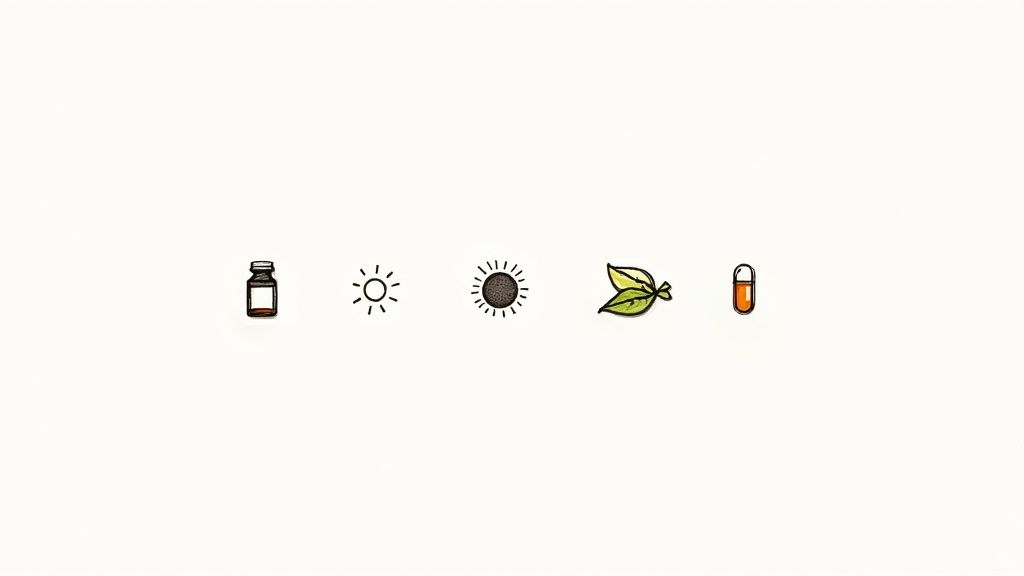
While sorting out your nutrition, sleep, and movement is absolutely non-negotiable, certain nutrients and botanicals can give you powerful, targeted support on your journey to hormonal balance. Think of them less as a magic bullet and more as skilled assistants, helping your body's systems do their jobs more effectively.
This isn't about jumping on every new supplement trend you see online. It’s about being strategic and choosing well-researched options that actually match what your body is telling you. The right ones can make a genuine difference in how you feel day-to-day, filling in nutritional gaps and building resilience from the inside out.
Start with the Foundational Building Blocks
Before you even think about the more specialised herbs, it’s crucial to make sure your body has the core nutrients it needs just to run its basic hormonal processes. Many of us are running low on these essentials, thanks to modern soil depletion and chronically stressed lifestyles. Simply topping them up can be a complete game-changer.
Understanding what makes up a balanced diet is always the first step, ensuring you cover your bases with food first. But when your system is really struggling, targeted supplementation can address specific gaps much faster than diet alone.
Here are the key players:
- Magnesium: Often called the "relaxation mineral," and for good reason. Magnesium is involved in over 300 different processes in the body. It’s particularly brilliant for calming the nervous system, which helps lower cortisol, ease PMS, and support deeper, more restorative sleep.
- B Vitamins: This family of vitamins, especially B6, is absolutely vital for making energy, keeping your mood stable, and helping your liver detoxify. They help your body clear out old hormones, which is essential for preventing issues like oestrogen dominance.
- Vitamin D: We call it the "sunshine vitamin," but it's technically a hormone itself. It plays a huge part in regulating insulin, supporting your thyroid, and keeping your whole endocrine system healthy. Given the classic UK weather, it’s no surprise that many of us have less-than-ideal levels.
Think of these foundational nutrients as the oil, coolant, and fuel for your hormonal engine. Without them, even the most finely tuned machine can't run smoothly. Ensuring you have adequate levels is often the first and most effective step.
Harnessing the Power of Adaptogens for Stress Resilience
Adaptogens are a truly remarkable class of herbs. They don't force your body to do one specific thing; instead, they help it adapt and become more resilient to physical, chemical, and biological stress. They work intelligently to normalise your body's functions and strengthen the systems that have been worn down by chronic stress.
They are particularly good at managing the cortisol rollercoaster that sits at the root of so many hormonal issues.
Ashwagandha and Rhodiola for Cortisol Control
Ashwagandha is probably the best-known adaptogen for its calming, restorative vibes. It's been shown to significantly lower cortisol levels, helping to take the edge off anxiety and promote a sense of calm without making you feel drowsy. If you often feel "wired but tired," this is one to look at.
Rhodiola Rosea, on the other hand, is a bit more energising. It's fantastic for fighting that unique mental and physical exhaustion that comes with long-term stress. If burnout and brain fog are your main complaints, Rhodiola can help bring back some focus and stamina. For a deeper dive into the options, you can explore our dedicated guide on supplements for hormone balance.
The Role of Traditional Botanicals like Shilajit
Beyond the more common adaptogens, traditional wellness systems have been using powerful natural substances for centuries to support vitality. One of the most revered is Shilajit, a mineral-rich resin that seeps from high-altitude mountain ranges.
Shilajit is packed with over 85 trace minerals and, crucially, fulvic acid. This unique compound is a potent antioxidant and acts like a transport vehicle, helping to carry these minerals directly into your cells. This enhances energy production right where it matters. Traditionally, it's been used to boost stamina and vitality, making it a valuable addition to any holistic plan for hormonal health.
To help you pull this all together, here’s a straightforward table summarising these key supplements and when you might consider them.
A Practical Guide to Hormone Support Supplements
| Supplement | How It Supports Hormones | Consider If You Experience |
|---|---|---|
| Magnesium | Calms the nervous system, lowers cortisol, aids sleep, and eases cramps. | Anxiety, poor sleep, muscle tension, PMS, or frequent stress. |
| B-Complex | Supports liver detoxification, energy production, and mood regulation. | Fatigue, sluggishness, brain fog, or signs of oestrogen dominance. |
| Ashwagandha | Lowers cortisol, reduces anxiety, and promotes a sense of calm resilience. | Feeling "wired but tired," anxious, or overwhelmed by stress. |
| Shilajit | Provides essential trace minerals, enhances cellular energy, and boosts vitality. | General fatigue, low energy, a feeling of depletion, or mineral deficiencies. |
When you start any new supplement, the golden rule is to introduce just one at a time and give your body a few weeks to respond. This is the only way you'll know for sure what's actually working for you. And, of course, it's always smart to have a chat with a healthcare practitioner, especially if you have existing health conditions or are taking any medication.
Creating a Plan That Lasts
Balancing your hormones isn't a race to a finish line; it's more like learning a new rhythm for your life. Your body is always changing, so the key to long-term wellness is to create a sustainable strategy that can adapt right along with you. This means learning to listen to your body's feedback and knowing when it's time to call in some expert support.
Think of this as the final piece of the puzzle. It’s about blending your own intuition with professional guidance when you need it, creating a truly balanced approach that you can rely on for the long haul.
Tracking Your Progress by Listening to Your Body
Forget about obsessing over numbers on a scale. The most powerful way to see how you're doing is to tune into your own biofeedback—the subtle signals your body sends you every single day. These are the real clues that your efforts are paying off.
Start by noticing a few key things:
- Energy Levels: Are you waking up feeling a bit more refreshed? Is that classic 3 p.m. slump not hitting you quite so hard anymore?
- Sleep Quality: Finding it easier to drift off? Or perhaps you're sleeping through the night more often?
- Mood Stability: Do you feel a little more grounded and resilient? Are everyday stresses not throwing you off balance so easily?
- Cycle Symptoms: If you have a period, are things becoming more regular? Is it less painful, or is PMS not as intense as it used to be?
Patience is your best friend here. These changes are gradual and often unfold over several weeks or even months. Try keeping a simple journal to jot down how you feel each day. Looking back over a month can reveal some really encouraging progress that you might otherwise miss.
Knowing When to Get Professional Support
Natural approaches can be incredibly effective, but they aren't a substitute for proper medical care. A truly sustainable plan means recognising when it’s time to chat with a healthcare professional, like your GP or a registered nutritional therapist.
There's a growing understanding in the UK that an integrated approach works best. While HRT is a common medical treatment, recent surveys found that over 60% of women aged 45-54 have tried natural remedies, and a significant 40% reported their symptoms improved. You can read more about these stats on Chemist-4-U. It just goes to show that combining your own efforts with professional oversight is a popular and effective path.
A proactive health plan isn’t about choosing between natural methods and medical advice. It’s about intelligently blending the two. You use lifestyle changes to build a strong foundation, and seek expert guidance for targeted support and diagnosis when you need it.
Make an appointment if you notice:
- Symptoms aren't improving after three to six months of consistent effort.
- Sudden or severe changes to your cycle, mood, or general health.
- Persistent problems like extreme fatigue, unexplained weight changes, or chronic insomnia that are getting in the way of your life.
When you do go, be prepared. Take your journal with you, and don't be afraid to advocate for yourself. Confidently explain the natural steps you’ve already taken. This kind of collaborative approach is what a successful, long-term wellness strategy is all about.
Your Questions on Natural Hormone Balance, Answered
Starting a journey to balance your hormones naturally is a brilliant step, but it often comes with a few questions. Let's clear up some of the most common things people ask when they're ready to take back control of their wellbeing.
How Long Does It Really Take to See Changes?
There’s no magic one-size-fits-all timeline here – your body is completely unique. However, most people start to notice the first little sparks of change, like more consistent energy levels and a brighter mood, within about four to six weeks of dedicated effort.
The bigger, more profound shifts – think regular, smoother menstrual cycles or finally getting that deep, restorative sleep you’ve been dreaming of – usually take a bit longer. Give it around three to six months for those changes to really take root. It’s not a race; think of it as a gentle, gradual healing process where patience and consistency are your best friends.
Can Diet Alone Balance My Hormones?
Nutrition is a massively powerful lever, but it can’t do all the heavy lifting on its own. You could be eating the most perfect, colourful, nutrient-packed diet in the world, but if you’re also swimming in chronic stress or barely sleeping, your body is still going to be in a state of high alert. This keeps stress hormones like cortisol firing, which can undo all your brilliant work in the kitchen.
The real magic happens when you bring everything together. Pairing a diet that keeps your blood sugar stable with smart stress management, quality sleep, and the right kind of movement creates a powerful synergy. That’s how you get lasting results for your hormonal health.
Do I Need to Get My Hormones Tested Before I Start?
While a hormone test can give you some really useful data and a clear starting point, it’s definitely not a prerequisite. The foundational habits we've been talking about – managing stress, eating whole foods, prioritising sleep, and moving your body – are universally beneficial for absolutely everyone, no matter what your specific hormone levels look like right now.
You can start putting these powerful lifestyle shifts into practice today. If you feel like you’ve hit a wall down the line or just want a more targeted approach, you can always look into testing with a qualified practitioner then.
What’s the Single Most Important Change I Can Make?
If you're going to start with just one thing, focus on balancing your blood sugar. It’s the first domino. When you get this right, it has a wonderful knock-on effect that helps to stabilise your entire endocrine system.
Eating regular meals packed with protein, healthy fats, and lots of fibre prevents those dramatic spikes and crashes in insulin and cortisol. When those are stable, other key hormones like oestrogen and testosterone have a much better chance of staying in their happy place. Master this, and you’ll create a solid foundation for every other positive change to build upon.
Ready to support your body with the essential minerals it needs for vitality and balance? The My Oji Shilajit gummies are expertly formulated to help restore your natural energy, enhance mental clarity, and build resilience to stress. Discover the difference at myoji.co.uk.


